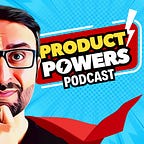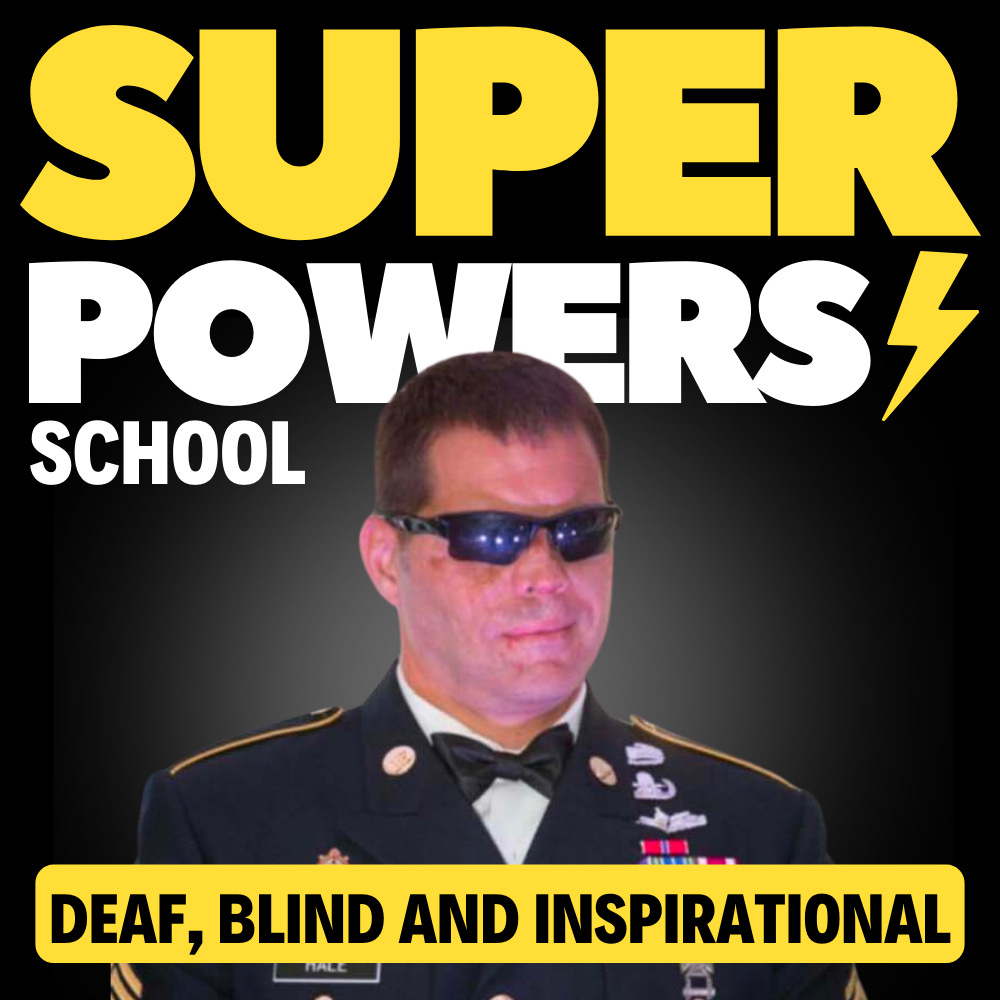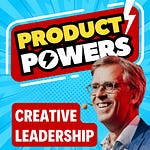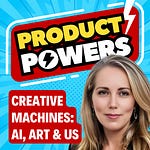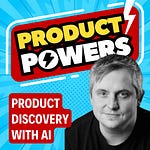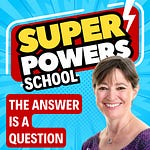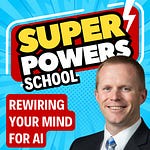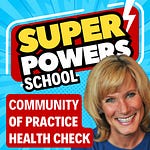Aaron Hale, a former U.S. military bomb technician, endurance athlete, and entrepreneur shares his inspiring journey. Starting with his military career, facing a life-altering bomb blast in Afghanistan, and coping with blindness and deafness.
Despite the challenges, Aaron discusses how he harnessed the power of pain and reframed his mindset to overcome emotional struggles. He emphasizes the importance of facing discomfort, learning from hardships, and avoiding the fear of failure. Aaron shares insights into his daily life, challenges, and the team effort involved in his ultra-endurance running, where he became the first blind and deaf person to complete the Badwater 135.
He talks about his podcast, Point of Impact with Aaron Hale, and his dedication to helping others by sharing his story of resilience and triumph.
👉🏽 Harnessing the Power of Pain
👉🏽 Overcoming Emotional Struggles
👉🏽 Creativity as a Superpower
Aaron Hale (Former U.S. Military Bomb Technician)
Aaron Hale, a 14-year veteran, military chef, and Explosive Ordnance Disposal (E.O.D) team leader has overcome all odds. From the moment a blast robbed Aaron of his vision in Afghanistan to years later when he lost his hearing, he refused to accept defeat.
Not letting his injuries hold him back, Aaron became an EOD instructor, motivational speaker, mountain climber, white water kayaker, and marathon runner.
Now equipped with cochlear implants and his wife McKayla at his side, Aaron has found his passion again–it’s back in the kitchen! Cooking is providing not only a sense of happiness for himself but for others around the world… one piece of fudge at a time. McKayla and Aaron work together every day to create these Extra Ordinary Delights, and they can’t wait to share them with you.
⚡️ In each episode, Paddy Dhanda deep dives into a new human Superpower and gives practical advice on how you can apply it immediately.
👉 Sign-up to Newsletter: https://www.superpowers.school/subscribe
👉 YouTube: https://www.youtube.com/c/paddydhanda/
★ BUY ME A COFFEE ★
If you enjoy the podcast, then you can donate a small amount here as a token of your appreciation: https://ko-fi.com/paddydhanda
Transcription:
[00:00:02] Aaron Hale: I became one of those people that get into the bomb suit and work on defusing everything that goes boom from bullets to nuclear weapons and weapons of mass destruction. there was a secondary device that hadn't been detected, it detonated in my face, and it took my eyes, it cracked my skull in a few places, it was a long, arduous, frustrating learning period. During the Covid era when everybody was quarantined, locked down, everyone was complaining about being isolated and lonely and not knowing what to do.
Imagine, I was thinking, welcome to my world And learning to deal with these two tragedies has actually amplified my my life. It's been a catalyst for my growth. I've learned that, every human we're, we're, wired to avoid discomfort. We hate failure. don't want to be ridiculed or mocked or judged. We don't want to feel that discomfort. And we certainly don't want to feel pain. And what we do is avoid these hardships.
And unfortunately, that's handicapping us sitting In the hospital bed, learning, just learning for the first time that I'm going to be blind for the rest of my life.
And you imagine the emotions that are going through one's mind. I can't do this, I can't do that. I'll never be able to do this again. You know, why me? What if? All those demons that creep into your mind. And, that was me. I was feeling awful.
[00:02:12] Paddy Dhanda: Dear friend, thank you for joining us for another episode of the Superpower School podcast. I am your host Paddy Dhanda and on today's episode I have someone who is truly inspiring and I am so excited for this conversation because I'm hoping to learn so much from him. He is deaf, blind. An endurance athlete and entrepreneur. Thank you for joining me today, Aaron Hale. Who's all the way from the U S Hey, Aaron
[00:02:43] Aaron Hale: Well, thank you for having me on, Paddy, and I did say I'm blind, deaf, and quite daft.
[00:02:49] Paddy Dhanda: that makes two of us. Don't worry. So Aaron, I would. I would really love to hear your story of how you came to be in this situation, because I know a little bit about you from reading up on you and hearing your story on other podcasts. But could you tell some of the listeners your journey and how is it that today we're going to be talking about a very inspirational topic?
[00:03:12] Aaron's Journey: From Military to Bomb Technician
[00:03:12] Aaron Hale: Of course I am a former U. S. military I started in the military as a Navy chef, then I jumped ship, so to speak, and became an Army bomb technician EOD, Explosive Ordnance Disposal. It's the military's bomb squad, and it's a far cry from Navy cooking. But I tell people when I got my first confirmed kill with an egg roll, I decided to start saving lives instead.
But the truth is, I joined in a time of peace in 1999, and then soon found myself like so many of us, in a time of war. Facing two different... enemies in two different lands, and I was, even though I was a part of the big military machine, I was cooking, and I loved what I was doing, but I knew that my skills and talents and abilities could be put to a better use towards mission success.
And that's when I switched uniforms and switched jobs and became an explosives expert. And I became one of those people that get into the bomb suit and work on defusing those roadside bombs, suicide vests, everything that goes boom from bullets to nuclear weapons and weapons of mass destruction.
[00:04:30] Life-Altering Incident: The Bomb Blast
[00:04:30] Aaron Hale: And I was on my third deployment in Afghanistan. When working on an IED, an improvised explosive device, roadside bomb, when there was a secondary device that hadn't been detected, it detonated in my face, and it took my eyes, it cracked my skull in a few places, left me with some Cuts and bruises and skin burns but thankfully alive.
However, my life was drastically changed. I was plunged into blindness 100%. And I lost some of my hearing at that time, but I hadn't gone completely deaf.
[00:05:10] Coping with Blindness and Deafness
[00:05:10] Aaron Hale: It wasn't until four years later, after I'd... I learned how to become a blind person and was making my best at it that the complications from the fractures in my skull came back to haunt me again.
And when bacterial meningitis crept into those cracks that we thought had been patched up. Well, the bacteria, that meningitis nearly killed me and I was in the hospital a second time four years after the bomb blast and despite living again, surviving one more time, the bacteria stole what was left of my hearing.
and left me 100 percent deaf on top of 100 percent blind. It wasn't until almost a year later that I was able to hear a little bit again through the advent of a cochlear implant. It's not a hearing aid. It It doesn't take sound in through the ear canal and amplify it. it takes the sound in, digitizes it, sends it through a magnetized tether to the implant that's inside.
And it sends the, that, you know, that digital signal right to the inner ear, the cochlea and right to the auditory nerve. So it was a long, arduous, frustrating learning period. Both times learning how to be blind and learning how to be blind and deaf. And if you can imagine when during the Covid era when everybody was quarantined, locked down, everyone was complaining about being isolated and lonely and not knowing what to do.
Imagine, I was thinking, welcome to my world, . But, I was no stranger to it. And learning to deal with these two tragedies has actually amplified my life, accelerated. It's been a catalyst for my growth. And, uh, I've become, since... Since the injury I've become a public speaker, a podcast host myself, a entrepreneur, real estate investor.
I've gotten married, had a pair of identical twin toddlers who are now four years old. And, of course, identical because I shouldn't be the only one who's confused. And I live a rich and fulfilling life. And in a sense, I'm actually very grateful for the path that I was thrust into.
[00:07:53] Paddy Dhanda: Oh, Aaron, thank you for sharing that personal story. And I just can't even begin to fathom what you've been through. And it's something that I think as the listeners are listening as well we're probably all reflecting on that situation and, you know, being thrust into such.
Devastation and then rising up from that the way you have and so Aaron on this episode superpower would you like us to deep dive on?
[00:08:21] Harnessing the Power of Pain
[00:08:21] Aaron Hale: It's harnessing the information from pain. I've learned that, every human we're, we're, wired to avoid discomfort. We hate failure. We don't want to be ridiculed or mocked or judged. We don't want to feel that discomfort. And we certainly don't want to feel pain. And what we do is avoid these hardships.
And unfortunately, that's handicapping us. Instead... You know, having been forced into painful difficult situations, uh, I've learned, I've grown, and I've actually become appreciative of the hard times of the painful times. Pain is chock full of information, if we're willing to pay attention and listen, and pain itself is.
is a mental construct. It's like the smoke detector. It's not the actual fire. So, if we listen to pain, if we listen to those emotions, it's going to tell us what we need to know. And we can act accordingly.
[00:09:31] Overcoming Emotional Struggles
[00:09:31] Aaron Hale: So, sitting In the hospital bed, learning, just learning for the first time that I'm going to be blind for the rest of my life.
And you imagine the emotions that are going through one's mind. I can't do this, I can't do that. I'll never be able to do this again. You know, why me? What if? All those demons that creep into your mind. And, that was me. I was feeling awful. I was angry. And I was sad and I was in mourning for a life of potential that will never be, and I was asking all the wrong questions and I was saying it was, I was all that self-talk that was leading me down a road that was a dead end.
If I kept saying I can't do this, or Why is this happening to me, then. There's no answer. It's impossible to answer. So you just go into a spiral of despair. And self defeat. It's self limiting.
[00:10:26] Reframing the Mindset
[00:10:26] Aaron Hale: But, if you can take a step back and imagine the and listen to the pain, the emotion, and try to separate yourself from the emotion and go to the the lesson that it's trying to teach.
So I started changing the questions instead of I, I can't do this, I would say, I can't navigate the world on my own anymore without, you know, someone's help. And now I say, how can I navigate the world? How can I do this? How can I do that? And it opens up a world full of opportunities. You know, I also stopped saying, why is this happening to me?
Rather, I would say, why is this happening for me? What can I learn from this? What information can I pull from a certain situation? And that opens up creativity, that opens up imagination, that builds your resilience. And you become far more resourceful and then every situation in your life becomes less about the pain itself, but the experience and the opportunity to grow.
So I've gone one step further to from why is this happening to me to why is this happening for me? And then the next step there is, why is this happening for me so that I can teach others? And that becomes the greatest strength. Because if you are always looking to help others, you are living a life of service.
And when you are living for something greater than yourself, then everything becomes manageable. Nothing is impossible. And that pain becomes so far diminished that you're not feeling it. This is a physical pain. This is emotional pain. So, all this discomfort, it's the catalyst for growth. And in fact, uh, when I find myself being too comfortable the warning bells start going off again I'm becoming stagnant, uh, maybe I'm not doing something I should be because I want to put myself into a perpetual state of discomfort and that has become my superpower.
[00:12:41] Paddy Dhanda: and Aaron again, it is absolutely mind blowing just hearing you talk there and just how you've reframed some of that language into a positive, into a more kind of open growth mindset approach. Can you remember the moment where things did start to change in your mind? So you mentioned you were, thinking, I can't, and then all of a sudden you were able to reframe that language. What was the contributing factors that helped you change that mindset?
[00:13:14] Aaron Hale: There are so many, uh, points where it was just me reframing the situation that made it so much more bearable and sometimes even enjoyable. I remember breeding about vice Admiral James Stockdale and the Stockdale Paradox. He is a Vietnam, POW. He was asked, Who...
Did you know who would make it? And who would not? And he said, of course. It was the optimistic. Which is a paradox there. You mean the ones that were just hopeful? Yes. And to explain, he would know when people weren't going to make it because... They would say something like, The Americans are going to come get us by Christmas.
And Christmas would come and go. And they would just move the date. Okay, so we're going to be rescued by Easter. And Easter would come and go. And eventually they would lose hope in rescue. And soon thereafter... They would commit suicide or die. You could tell when all of the life had drained out of them.
That positivity, that optimism, that hope was gone. And rather, it was the ones that could endure were the ones that said, that, that realized they don't put a finish date on it. They had a firm grasp of the reality in front of them with faith. In the positive ending. So, for me, those transition points were when I was completely deaf and completely blind.
And sitting at my breakfast bar at home, you know, in my kitchen counter trying to figure out what I was going to do with the rest of my life. I loved running. But I'd also lost my inner ear balance, vestibular balance, when I lost my hearing, so I came home in a wheelchair. It was pretty desperate. I couldn't even get onto my treadmill because it was like somebody was trying to steal it from under me.
So I went back to cooking. I knew that I could still cook, I could still taste, and I could still smell, and that positive. Action, taking a step towards something, keeping myself busy, and I was cooking for Thanksgiving. It was a holiday that I love so much. One, because you get to gather everybody around you for to talk about what you're most grateful for in the world, with the people you're most grateful to be around.
Hopefully. And the second reason is because it's an excuse to eat like an absolute glutton. I started cooking, and I remembered everything I enjoy about cooking. And then, one day, after having this thing tuned in a little bit more, I accidentally hit my wooden spoon against the pot while cooking some fudge and it actually sounded like wood against iron, wood against steel.
That clang and that little piece of joy entered my world again. And before I knew it, my before I knew it, my wife was coming out of the bedroom going what is all that racket as I was like a toddler that had gotten into the cabinets playing drums on all of the pots and pans. And I just told her, sweetheart, this sounds like me clanging on pots and pans.
She's like, I know. And then she realized what I meant. So, I took joy in a little bit of progress and that's part of leaning into the pain and being creative, doing activities that you know, are small steps. You don't have to take massive change every single time and that, of course, trying to make.
Huge improvements uh, will lead to burnout. All you need is that 1 percent one step forward every single day and appreciate the small wins and you'll live a life of fulfillment.
[00:17:09] Paddy Dhanda: I am a terrible cook, Aaron, so I do envy you. I can just about boil an egg. So let's just put it that way. That's about my extent of my cooking ability.
[00:17:19] Aaron's Daily Life and Challenges
[00:17:19] Paddy Dhanda: But your life now, could you put it into perspective for us in terms of does a typical day look like for you and what are some of the challenges that you've had to overcome from waking up in the morning through to going to sleep at night?
[00:17:36] Aaron Hale: I've had to learn how to face so many challenges, big ones of course, and even little ones. Imagine trying to pair your socks So, you know, speaking of cooking you know, there was definitely a learning curve when it came to learning how to cook all over again, when you couldn't see the pot or pan, or even where the dial on the stovetop was to know the heat.
So, at first, the fire alarm scared the heck out of my children. And then it became the dinner bell, smoke alarms going off, dad's done with with dinner. But my daily routine starts fairly early, of course, because toddlers they have no respect for full night's sleep beauty rest, but I also appreciate having my own time in the morning is the time to get things going, and I truly believe in prioritizing my day and putting the most important things first.
Getting that out of the way, three or so of my most important next steps in work life. And fitness and I believe in, you know, decision fatigue we make about 30, 000 different decisions from pair of socks we're going to wear what pants we're going to put on to should we refinance that house or, you know, partner on the, somebody on the next deal.
So yeah. I try to take as many of the morning decisions away out of my day as possible. So the day before, I'll set up my clothes for the morning. I'll pre set my coffee pot so I don't even have to decide whether or not I'm going to turn it on. It's just going to be ready for me. And I just, I try to build in habit versus routine.
And I think that's one of those things that people get it's kind of a misnomer. I need to get into the habit of working out, or I need to get into the habit of eating better. And the difference is habit is something that you can do with regularity without, with little to no thinking or effort.
And a routine is something you have discipline in doing. . thOugh it does take some thought and some effort. So a lot of things we call habit are really routines and I wanna make my morning routine as much habit as I possibly can, so I don't want to think about it. And the very first thing I want to do is get the most important thing out of the way.
When I'm at my most fresh. So, First, my most important thing in the whole world are my children. I get them ready for school. feEd them. And that brightens my day. And once the house is nice and quiet again, then I set my most important business activities.
[00:20:31] Paddy Dhanda: Aaron, how old are your children, by the way? Just so we get a view of the level of support you have to give them.
[00:20:36] Aaron Hale: I've got a soon to be teen, 13 years old, and twin 4 year old boys. All boys.
[00:20:44] Paddy Dhanda: Wow. Okay, so that puts things into perspective for me, because I was assuming maybe, you've got one or two kids, but you've got three, and there are very challenging ages. I sympathize.
[00:20:56] Aaron Hale: Yeah, so I am a stay at home dad with a e commerce fudge shop. And my wife and I are real estate investors with a portfolio in a couple of different states in the U. S. And on top of that, I'm an ultra endurance runner, so I run ultra marathons, 100 miles. And just this past July, I became the first...
blind deaf person to complete the Badwater 135. It's a ultra, uh, foot race. It's called the world's toughest foot race across Death Valley and up to the Mount Whitney portal. It's 135 miles across Death Valley and three mountain ranges.
[00:21:45] Paddy Dhanda: That's just phenomenal. I mean, that type of challenge, I think even for someone who's fully able bodied, find extremely challenging. How do you navigate that? Is it a case of using some technology to help you, some support from someone, or is it entirely down to you?
[00:22:05] Aaron Hale: Everything in my life has become a team sport Everything. You know, it's very unwise of me to just lace up and step out my front door for a run. So, when it comes to running it's very simple. I use a short tether that a running guide, a sighted guide and a fellow runner holds onto and I hold on to another end.
We've got just a little piece of nylon with two loops and I slip a couple fingers in one loop and my guide slips fingers into the other loop and we run side by side, almost as though we're holding hands. That's gonna get all my cues from where that tether goes. Now, as a little piece of creativity or inspiration, we learned just two days before Badwater that I would have to run single file for the, almost the entire 135 miles.
And we had to come up with an entirely new... Method for blind running that I'd never done before So we used some trekking poles that I would hold onto the handles and I'd lift up the tips of the trekking poles so they were horizontal and we taped them to my guide's waist belt that says guide on it, or pacer.
So it was a pacer's belt. And uh, that's how we ran the entire way. It worked out great. In fact, it actually worked out better than the side by side method. beCause from the motion of my guide's hips the Trekking poles actually moved like horizontal pistons, and I was able to have a natural arm swing, which I hadn't had in, oh, about a decade of running blind, from holding on to a tether with somebody who was going shoulder to shoulder with me.
So, it was just another example of how necessity was the mother of invention. And we... We actually did it from taking something that was comfortable or, you know, something that was known And taking that away and creating something absolutely new at a point of discomfort
[00:24:24] Paddy Dhanda: That's like something so simple yet it's had such a profound impact. On your experience, as you mentioned, you're now able to have that natural movement when you're running that's phenomenal. And Aaron, mentioned at the start, you've now had the opportunity to help others by sharing your story.
Could you tell us a bit more about that? In what ways have you managed to touch other people and any stories that you can share there?
[00:24:53] Aaron Hale: Of course decade now, 12 years
I've become a bit of a case study in resilience, so, and part of that is, it's, you know, one hand washing the other. I want to learn how to become more resilient and face these difficulties so that I can teach it. And share it with others. And that makes it in turn a lot more easy to face the challenges ahead.
So now I host my own podcast, Point of Impact with Aaron Hale. I'm a public speaker and I've traveled all over the country telling corporations, non profits, veterans groups, and telling my story of this. You know, success because of struggle, and triumph because of tragedy. We've got to face our fears.
We've got to lean into that pain. And we've got to not be afraid of failure. Because like I said, pain is chock full of information. If we're willing to and open or to look at it and learn from it.
[00:26:04] Paddy Dhanda: Oh, amazing.
[00:26:05] Aaron's Aspirations and Future Goals
[00:26:05] Paddy Dhanda: And have you still got other aspirations that you want to fulfill yet? Like what are some of the things that are on your mind that you want to do next? Because I'm sure I know the answer to this, but I'd love to hear the details behind it.
[00:26:17] Aaron Hale: I'm focusing a lot on making the podcast the best it possibly can, so it means becoming a better speaker Myself becoming a better podcaster. And bringing on many incredible guests that have their stories to share and teach. And you know, running a couple businesses, so of course that takes a lot of my focus.
But the number one challenge, and my favorite challenge, is being a great husband and dad. And I don't know all the answers. But I'm open and willing to learn and I'm up for the challenge. Of course, when it comes to endurance races, I'm always looking for something that my first instinct is that's crazy.
So, there is a Himalayan Race Ultra Marathon. that runs across a few Himalayan mountain ridges. And there's something called the Coast to Cozy, which is a, I think it's a 150, 160 mile race from the Australian coast to the tallest peak in the continent. But there are so many challenges out there, physical, mental.
And as long as I'm learning and growing and pushing myself I believe I'm becoming a better person for my family, for my fellow wounded veterans and everybody in general. So,
[00:27:51] Paddy Dhanda: Oh, nice. And Aaron. I've started to incorporate a new question into the podcast, and I gave you a little bit of a warning right at the start. So, I'm hoping you've had some time to ponder over this one. So, if you could have any superpower in the world to abolish something on the planet, What would that be?
[00:28:10] Aaron Hale: I believe it would be the power to take away narcissism. Which I believe is the opposite of creativity. I think creativity is an openness. It's humility. You're open to learn. And creativity is where, it's just the ability to connect pieces. Connect the dots. Put a puzzle together. So if you're not looking at a mirror, right, if you're not looking, just thinking about yourself and you're thinking about the world as a puzzle, a challenge to put together, then I believe that if more people could do that, this world would be a far greater, a better place.
[00:28:51] Paddy Dhanda: Oh, I love that. And creativity is close to my heart too. So, I am feeling that one a hundred percent. Aaron, we're fast approaching time. How do people get in touch with you for they'd like to continue to follow you and follow your amazing journey?
[00:29:06] Aaron Hale: I'm at A. Clay Hale. On Instagram and Facebook, and you can of course, tune into the podcast Point of Impact with Aaron Hale.
[00:29:17] Paddy Dhanda: Fantastic. And we'll include the links. It's in the show notes as well. So folks, you don't have to remember all of that. If you're driving you can definitely when you park up, click on the link and check it out and Aaron, I'm hoping to be on your podcast too. I've just got to schedule that in with you because I would love to continue our conversation.
And sort of continue the banter because I heard you're bit of a fan of Indian food. And again, that's something close to my heart. So if you're ever in Birmingham in the UK, then I will definitely take you out for a curry. And I'm biased and I will say this. on air. I'll take you for the best curry in the UK.
So,
[00:29:57] Aaron Hale: fun.
[00:29:57] Paddy Dhanda: That's my commitment to you.
[00:29:58] Aaron Hale: That sounds fantastic. I haven't been to the UK since 2014, it's been a while. And I could definitely go for some real fish and chips and some good curry. I just can't find it around here. it would be my honor to have you on my show as well. Thank you.
[00:30:13] Paddy Dhanda: Oh, thank you, Aaron. And yeah, now you've got a reason to build that business case to come to the UK. It's been such a pleasure. It's been so inspirational hearing your story. I've certainly become a lot wiser than I was at the start of this conversation. So thank you so much. just love the way you have such a positive outlook and the way that you've gone through all of these challenges and not let them get in the way of your progress and.
You know, you're climbing mountains. You're talking about climbing up to the Himalayas. It's something that don't think, you know, many people could even fathom. So, yeah, well done. And thank you so much.
[00:30:49] Aaron Hale: Thank you, Paddy. This is it's an honor to be on the show, and just to follow up with that we underestimate how powerful our minds really are. It's become cliche, but It's not until we're put into or we put ourselves into extraordinary situations that we find out just how extraordinarily strong we really are.
[00:31:09] Paddy Dhanda: Oh, what a lovely way to finish. Thank you so much, Aaron.
[00:31:12] Aaron Hale: Thank you.

